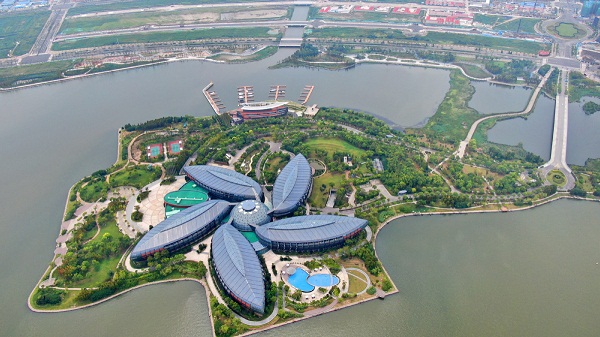Pudong area marks 30 years of economic progress

Lingang Special Area was included in the Shanghai Free Trade Zone in August last year. [Photo by Xu Congjun/For China Daily]
Successful flotations
The finance industry in Pudong, which has witnessed many "firsts "over the past 30 years, has not only made it easier to develop the real economy, but has also served the country's reform and opening-up.
The technology-focused STAR Market, launched on the Shanghai Stock Exchange in July last year, has seen more than 185 companies successfully floated, with total financing for initial public offerings, or IPOs, topping 272 billion yuan ($41 billion).
An IPO mechanism based on registration was first launched on the STAR Market, marking a major advance in A-share market reform. Companies not reporting profit or those with dual-class ownership-a type of stock offering in which companies issue shares that have differing rights-are allowed an IPO for the first time on the Nasdaq-like market.
According to professional services provider EY, the Shanghai bourse, boosted by the STAR Market, overtook all exchanges worldwide in the first half of this year in terms of the number of IPOs and total financing value.
Yang Chao, deputy governor of Pudong, said that last year Shanghai also reported the world's largest trading volume in commodities futures and options.
At least 1,098 commercial banks and securities companies are registered in Pudong, along with 2,000 financial service providers.
More than 41 percent of foreign banks, 40 percent of overseas insurers and over 90 percent of foreign private equity companies registered with China's financial watchdogs have set up offices in the district. Nine of the world's 10 largest asset management companies also have a presence in Pudong.
A large number of leading global financial institutions with their China or regional headquarters in Pudong have benefited from local financial opening-up policies.
In 1995, Japanese lender Fuji Bank set up its office in the district, becoming the first foreign bank in China.
In November 2018, multinational bank and investment services company UBS was given approval by the China Securities Regulatory Commission to become the country's first foreign-controlled securities firm. Also at the beginning of this year, Allianz (China) Holding was unveiled as the nation's first wholly-owned foreign insurance holding company.
 Contact Us
Contact Us

 Brilliant light show to illuminate Huangpu River
Brilliant light show to illuminate Huangpu River Maple leaves paint splendid scenery in Pudong
Maple leaves paint splendid scenery in Pudong Appreciate alluring lotus blossoms in Pudong's Century Park
Appreciate alluring lotus blossoms in Pudong's Century Park New pedestrian street boosts Pudong's night economy
New pedestrian street boosts Pudong's night economy 


